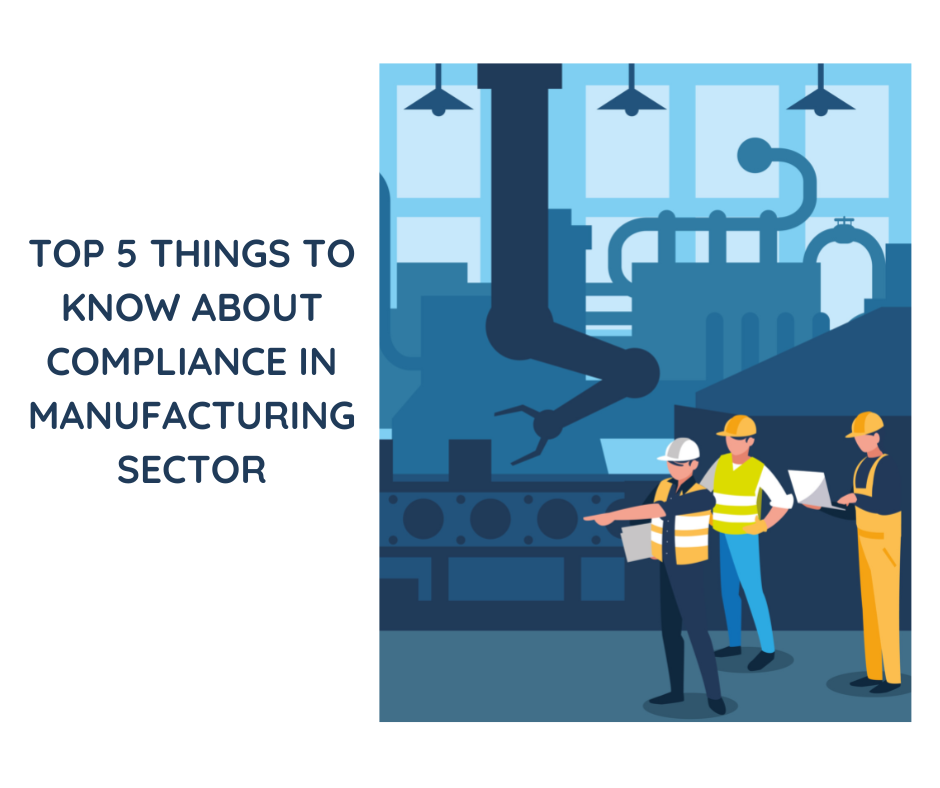Noncompliance can ruin corporate reputations, shatter financial performance, with the non-compliant regulation are undivided attention in the organization?
Manufacturing companies must be aware of various legal, regulatory, technical and corporate governance requirements, they must comply to operate as a successful business. Manufacturing compliance refers to the adherence to regulations and laws applies to the manufacturing sector. These requirements are designed for the businesses and consumers from risk for manufacturing legally. These standards are appropriated to environmental protection, health and safety, product quality, and performance can all be part of this process. Therefore, staying compliant is crucial for the businesses’ long-term success and sustainability.
Crucial areas of manufacturing compliance:
The Specific legislative and regulatory requirements will differ for manufacturing companies depends on where they carry out their operations and what type of manufacturing are they involved in. However, these are the major areas of manufacturing requirements in compliance:
- Product safety
- Workplace health and safety laws
- Quality standards
- Environmental protection standards
- Export controls
- Data security and protection
- Employment laws
- Taxation and company finance regulations
- Securities and exchange regulations
- Anti-corruption laws
- Fair trading/competition laws
Here comes the compliance regulation in the manufacturing industry to stay complaint:
Main steps to ensure compliance in the manufacturing sector:
Regulations in the manufacturing sector are constantly evolving, and it is a well-known fact that compliance with these regulations can be challenging and complex for many companies. To address this issue, we have created a guideline with key compliance steps for manufacturing companies to follow and effectively meet their obligations.
Determine the applicable rules and regulations:
Understanding which regulations and standards apply to your company’s operations is the first step in remaining compliant. These are all examples of regulations pertaining to the environment, health and safety, product safety and quality, laborlaw compliance and employment laws, and export and import regulations.
Create and implement procedures and policies:
To ensure compliance, you should develop policies and procedures after identifying the relevant standards and regulations. All employees should be informed of these policies and procedures, and they should be reviewed and updated regularly to ensure that they are current and influential.
Observe and audit compliance:
Monitoring and examining compliance on a regular basis assists in determining areas for improvement and ensuring that your business is meeting its obligations. This could mean hiring an external auditor to review your company’s compliance efforts or conducting internal audits. Additionally, it is essential to keep track of and record compliance efforts because doing so can assist in demonstrating a dedication to compliance and may be required for regulatory purposes.
Create a strategy for non-compliance:
A method for dealing with and resolving non-compliance issues as they arise is essential. This might entail collaborating with regulators to find a solution to the problem, carrying out corrective measures, and taking steps to stop similar problems from happening again.
Training and communication:
Compliance is not just about paperwork and record-keeping; it also involves training employees on the regulations and best practices for maintaining statutory compliance. This includes training on workplace safety, environmental regulations, and other compliance-related topics. Clear communication is also essential for ensuring everyone in the organization understands their responsibilities and the importance of compliance.
Supply chain management:
Manufacturers are often responsible for ensuring that their suppliers and subcontractors also comply with relevant regulations. This involves monitoring suppliers and their practices to ensure they meet the necessary standards. Manufacturers should have a process in place for evaluating suppliers and communicating statutory compliance requirements.
Another way to eliminate risks of non-compliance is:
Considering the possibility of hefty fines, loss of reputation, and even imprisonment in case of non-compliance, it’s no surprise that many companies find these steps complex and daunting. TalentPro provides a centralized platform for tracking and managing complianceactivities and can help companies stay updated on the latest regulations and eliminate non-compliance risks.
Read more:( Effective Statutory Compliance Strategies for HR in the Manufacturing Sector)
Wrap-up:
However, staying non-compliant, violating the regulatory compliance often result in legal punishment, including fines, to overcome this we the Talentpro is one of the best compliance companies in India are adhered to laws, regulations, guidelines and specifications relevant to the business processes.







